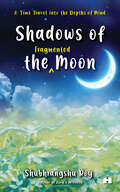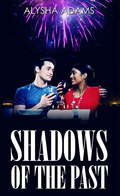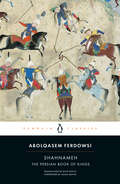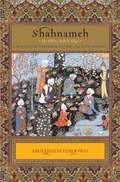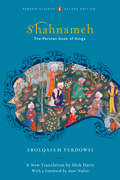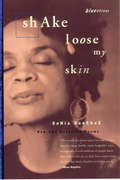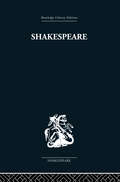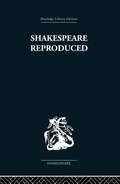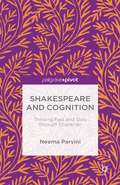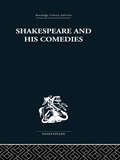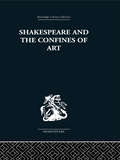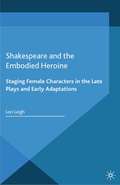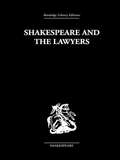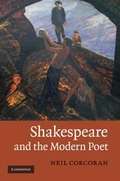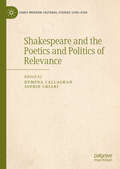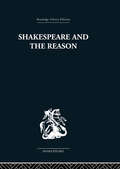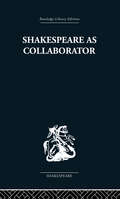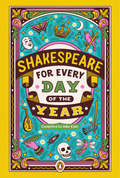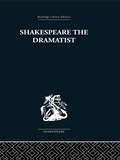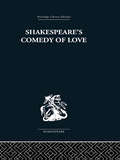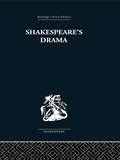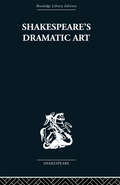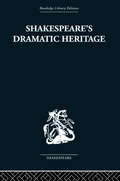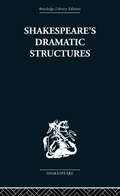- Table View
- List View
Shadows of the Fragmented Moon: A Time Travel into the Depths of Mind
by Shubhrangshu RoyThis fullness is filled with fullness. Fullness is born from fullness. Fullness fills fullness. In fullness, fullness is ever rested. This collection of poems attempts to unlock the wisdom of our ancient seers for the benefit of the layfolk, often eulogised for their resilience in the face of depredations of time, but with no one to turn to—not even the gods—for succour, mercy, and redemption, and far removed from expensive and time-consuming modern psychiatric intervention. It has nothing to do with religion or rituals; nothing to do with an exclusive or an exclusivist lifestyle. Rather, these poems seek to help us cope with the circumstances that confront us on our eventful walk through life. In Shadows of the Fragmented Moon, each poem has a hidden and unexplored facet of human trait that needs confronting to clear the path of ill-informed illusions. For, as the seers have claimed down the ages, the mind is only an aggregate of desires and nothing else. We humans are a conglomerate of our emotions and reason . . . without purpose, without a second chance. Understanding this one truth alone sets us free.
Shah Husain
by Harjinder Singh DhillonOn the works of Shah Husain, 1539-1599, Panjabi Sufi poet; includes selections translated into English.
Shahnameh
by Azar Nafisi Dick Davis Abolqasem FerdowsiThe definitive translation by Dick Davis of the great national epic of Iran--now newly revised and expanded to be the most complete English-language edition Dick Davis--"our pre-eminent translator from the Persian" (The Washington Post)--has revised and expanded his acclaimed translation of Ferdowsi's masterpiece, adding more than 100 pages of newly translated text. Davis's elegant combination of prose and verse allows the poetry of the Shahnameh to sing its own tales directly, interspersed sparingly with clearly marked explanations to ease along modern readers. Originally composed for the Samanid princes of Khorasan in the tenth century, the Shahnameh is among the greatest works of world literature. This prodigious narrative tells the story of pre-Islamic Persia, from the mythical creation of the world and the dawn of Persian civilization through the seventh-century Arab conquest. The stories of the Shahnameh are deeply embedded in Persian culture and beyond, as attested by their appearance in such works as The Kite Runner and the love poems of Rumi and Hafez. For more than sixty-five years, Penguin has been the leading publisher of classic literature in the English-speaking world. With more than 1,500 titles, Penguin Classics represents a global bookshelf of the best works throughout history and across genres and disciplines. Readers trust the series to provide authoritative texts enhanced by introductions and notes by distinguished scholars and contemporary authors, as well as up-to-date translations by award-winning translators.From the Trade Paperback edition.
Shahnameh: The Persian Book of Kings
by Azar Nafisi Dick Davis Abolqasem FeftdowsiBest most up-to-date English translation of the national epic of Iran.
Shahnameh: The Persian Book of Kings
by Dick Davis Abolqasem FerdowsiAmong the great works of world literature, perhaps one of the least familiar to English readers is the Shahnameh: ThePersian Book of Kings, the national epic of Persia. <P><P>This prodigious narrative, composed by the poet Ferdowsi between the years 980 and 1010, tells the story of pre- Islamic Iran, beginning in the mythic time of Creation and continuing forward to the Arab invasion in the seventh century.As a window on the world, Shahnameh belongs in the company of such literary masterpieces as Dante's Divine Comedy, the plays of Shakespeare, the epics of Homer-- classics whose reach and range bring whole cultures into view. In its pages are unforgettable moments of national triumph and failure, human courage and cruelty, blissful love and bitter grief.In tracing the roots of Iran, Shahnameh initially draws on the depths of legend and then carries its story into historical times, when ancient Persia was swept into an expanding Islamic empire. Now Dick Davis, the greatest modern translator of Persian poetry, has revisited that poem, turning the finest stories of Ferdowsi's original into an elegant combination of prose and verse. For the first time in English, in the most complete form possible, readers can experience Shahnameh in the same way that Iranian storytellers have lovingly conveyed it in Persian for the past thousand years.
Shake Loose My Skin
by Sonia SanchezAn extraordinary retrospective covering over thirty years of work, Shake Loose My Skin is a stunning testament to the literary, sensual, and political powers of the award-winning Sonia Sanchez.
Shakespeare (Shakespeare Survey Ser. #Series Number 7)
by Allardyce NicollFirst published in 1952. An invaluable introduction to Shakespeare, this book places Shakespeare's work and criticism against the background of Elizabethan life in its historical, social, political, religious, linguistic and literary aspects. Contents include: The Problem of Interpretation; Shakespeare at Work; Man and Society; Man and the Universe; The Inner Life.
Shakespeare Reproduced: The text in history and ideology
by Jean E Howard Marion F O’ConnorFirst published in 1987. The essays in Shakespeare Reproduced offer a political critique of Shakespeare's writings and the uses to which those writings are put Some of the essays focus on Shakespeare in his own time and consider how his plays can be seen to reproduce or subvert the cultural orthodoxies and the power relations of the late Renaissance. Others examine the forces which have produced an overtly political criticism of Shakespeare and of his use in culture. Contributors include: Jean E Howard and Marion O'Connor, Walter Cohen, Don E Wayne, Thomas Cartelli, Peter Erickson, Karen Newman, Thomas Moisan, Michael D Bristol, Thomas Sorge, Jonathan Goldberg, Robert Weimann, Margaret Ferguson.
Shakespeare and Cognition: Thinking Fast and Slow through Character
by N. ParviniShakespeare and Cognition challenges orthodox approaches to Shakespeare by using recent psychological findings about human decision-making to analyse the unique characters that populate his plays. It aims to find a way to reconnect readers and watchers of Shakespeare's plays to the fundamental questions that first animated them. Why does Othello succumb so easily to Iago's manipulations? Why does Anne allow herself to be wooed by Richard III, the man who killed her husband and father? Why does Macbeth go from being a seemingly reasonable man to a cold-blooded killer? Why does Hamlet take so long to kill Claudius? This book aims to answer these questions from a fresh perspective.
Shakespeare and his Comedies
by John Russell BrownFirst published in 1957. This edition reprints the second edition of 1962.The originality, vitality and variety of Shakespeare's comedies do not suggest a writer at ease with a formula which works to his own satisfaction and the pleasure of his audience; against first impressions they suggest an artist seeking to express an idea which is always eluding a completely developed presentation. The second edition of this book contains an extensive new chapter on Pericles, Cymbeline, The Winter's Tale and The Tempest.
Shakespeare and the Confines of Art
by Philip EdwardsFirst published in 1968. By selective study of certain of the comedies, tragedies and sonnets, Philip Edwards views Shakespeare's work as a whole and explains why his art developed as it did. The work which the author sees Shakespeare striving to create is the perfect fusion of comedy and tragedy and he suggests that we are watching the progress of a mind as acutely conscious as anyone today of the disorder and lack of meaning in the world. Nevertheless, it remains faithful to the possibility that within the imaginable forms of drama there exists that play which will satisfy the basic human need for reassurance, order and control.
Shakespeare and the Embodied Heroine: Staging Female Characters in the Late Plays and Early Adaptations (Palgrave Shakespeare Studies)
by L. LeighShakespeare and the Embodied Heroine is a bold new investigation of Shakespeare's female characters using the late plays and the early adaptations written and staged during the seventeenth and eighteenth century.
Shakespeare and the Lawyers
by O Hood PhillipsFirst published in 1972. Shakespeare's writing abounds with legal terms and allusions and in many of the plays the concept and working of the law is a significant theme. Shakespeare and the Lawyers gives a comprehensive survey of what Shakespeare wrote about the law and lawyers, and what has been written, particularly by lawyers, about Shakespeare's life and works in relation to the law. The book first reviews the recorded facts about Shakespeare's life and works, and his connection with the Inns of Court. It then discusses legal terms, allusions and plots in the plays; Shakespeare's treatment of the problems of law, justice and government; his description of lawyers and officers of the law; his references to actual legal personalities; and his trial scenes. Two further chapters consider the criticisms that have been made of Shakespeare's law, and the contribution to Shakespeare studies by lawyers.
Shakespeare and the Modern Poet
by Neil CorcoranShakespeare is a major influence on poets writing in English, but the dynamics of that influence in the twentieth century have never been as closely analysed as they are in this important study. More than an account of the ways in which Shakespeare is figured in both the poetry and the critical prose of modern poets, this book presents a provocative new view of poetic interrelationship. Focusing on W. B. Yeats, T. S. Eliot, W. H. Auden, Ted Hughes and Sylvia Plath, Neil Corcoran uncovers the relationships - combative as well as sympathetic - between these poets themselves as they are intertwined in their engagements with Shakespeare. Corcoran offers many enlightening close readings, fully alert to contemporary theoretical debates. This original study of influence and reception beautifully displays the nature of poetic influence - both of Shakespeare on the twentieth century, and among modern poets as they respond to Shakespeare.
Shakespeare and the Poetics and Politics of Relevance (Early Modern Cultural Studies 1500–1700)
by Dympna Callaghan Sophie ChiariFour years on from George Floyd’s murder, this volume asks if and how Shakespeare might be relevant—whether in performance, in the classroom, or in scholarship—to the pressing issues of social and climate justice. This question, however, is accompanied by the acute and uncomfortable recognition that there have been other consequences to the awakening of the world since Floyd's death, including the call to cancel Shakespeare altogether. This volume, however, is not an apology for Shakespeare but rather an engagement with him. From the perspective of the scholars who contribute here, questions about Shakespeare in our current context are not only deeply enmeshed with issues about his historical, geographical, and performance context and its attendant alterity, but crucially also to the specifically literary forms and structures with which he worked. Even as these essays resist the idea of a “timeless,” universalist Shakespeare, they insist upon the “poetics,” the creative framework, the specifically literary dimensions of the plays that cannot be reduced to any paraphrasable content. These are precisely the features that facilitate and enable the “relevance” of Shakespeare’s works even across the chasm of the centuries since he composed them.
Shakespeare and the Reason: A Study of the Tragedies and the Problem Plays
by Terence Hawkes'Mr Hawkes is a good critic, oriented towards history of ideas. He operates on the formula that Shakespeare was interested in the available distinctions between discursive and intuitive reason, and disliked a growing tendency for the first to be thought of as manly and the second effeminate. One sees how this action-contemplation polarity works, in Hamlet for instance, and Mr Hawkes thinks the kind of choices forced on tragic heroes can be better understood in terms of it.' Frank Kermode, New Statesman. In the seven plays on which the book concentrates, Terence Hawkes finds Shakespeare investigating the operation of two opposed forms of reason, and constructing dramatic metaphors such as the opposition between appearance and reality, or that between true 'manliness' and its false counterpart, which express to the full the tragic nature of the situation.
Shakespeare as Collaborator
by Kenneth MuirThis edition first published in 1960. This book discusses the extent of Shakespeare's collaboration in the plays of Edward III, The Two Noble Kinsmen, Pericles and the lost Cardenio. It includes chapters on the dramatic value of the plays irrespective of authorship.
Shakespeare for Every Day of the Year
by Allie Esiri"Shakespeare for Every Day of the Year is not just for Christmas, but for all time." —Helena Bonham CarterA magnificent collection of 365 passages from Shakespeare's works, for the Shakespeare scholar and neophyte alike.Make Shakespeare a part of your daily routine with Shakespeare for Every Day of the Year, a yearlong collection of passages from Shakespeare's greatest works. Drawing from the full spectrum of plays and sonnets to mark each day of the year, whether it's a scene from Hamlet to celebrate Christmas or a Sonnet in June to help you enjoy a summer's day. There are also passages to mark important days in the Shakespeare calendar, both from his own life and from his plays: You'll read a pivotal speech from Julius Caesar on the Ides of March and celebrate Valentine's day with a sonnet. Every passage is accompanied by an enlightening note to teach you its significance and help you better appreciate the timelessness and poetry of Shakespeare's words. Shakespeare for Every Day of the Year will give you a thoughtful way reflect on each day, all while giving you a deeper appreciation for the most famous writer in the English language.
Shakespeare the Dramatist: And other papers
by Una Ellis-FermorFirst published in 1961. On her death, Professor Ellis-Fermor left behind some uncollected essays and part of a book on Shakespeare the Dramatist. This volume includes the chapters of the unfinished work and three further articles on Shakespeare. It discusses Shakespeare's methods with regard to plot, character, diction, and imagery and it contains comparative analysis of Shakespeare with other dramatists, including Ibsen and Corneille.
Shakespeare's Comedy of Love
by Alexander LeggattFirst published in 1987. This study removes some of the critical puzzles that Shakespeare's comedies of love have posed in the past. The author shows that what distinguishes the comedies is not their similarity but their variety - the way in which each play is a new combination of essentially similar ingredients, so that, for example, the boy/girl changes in The Merchant of Venice are seen to have a quite different significance from those in As You Like It.
Shakespeare's Drama
by Una Ellis-FermorFirst published in 1980. This collection of essays by the first General Editor of the New Arden Shakespeare brings together the best of Ellis-Fermor's Shespearean criticism, in addition to outstanding essays on Coriolanus and Troilus and Cressida. Collected and edited by Kenneth Muir, the book is prefaced by an appreciation of Ellis-Fermor's work.
Shakespeare's Dramatic Art: Collected Essays
by Wolfgang ClemenFirst published in 1972. Studying Shakespeare's 'art of preparation', this book illustrates the relationship between the techniques of preparation and the structure and theme of the plays. Other essays cover Shakespeare's use of the messenger's report, his handling of the theme of appearance and reality and the basic characteristics of Shakespearian drama.
Shakespeare's Dramatic Heritage: Collected Studies in Mediaeval, Tudor and Shakespearean Drama
by Glynne WickhamShakespeare's Dramatic Heritage shows that the drama of Elizabethan and Jacobean England is deeply indebted to the religious drama of the Middle Ages and represents a climax, in secular guise, to mediaeval experiment and achievement rather than a new beginning. This is fully examined in terms of dramatic literature as well as in terms of theatres, stages and production conventions. The plays studied include: Richard II, A Midsummer Night's Dream, Hamlet, Macbeth, Coriolanus, The Winter's Tale and Marlowe's King Edward II.
Shakespeare's Dramatic Structures
by Anthony BrennanFirst published in 1986. The focus of this book is the dramatic strategies of scenic repetition and character separation. The author traces the way in which Shakesperare often presents recurring gestures, dramatic interactions, and complex scenic structures at widely separated intervals in a play - thereby providing an internal system of cross-reference for an audience. He also examines the way in which Shakespeare increases the dramatic voltage in central relationships by limiting the access key characters have to each other on stage. These strategies, it is argued, are indelible marks of Shakespeare's craftsmanship which survive all attempts to obliterate it in many modern productions.
